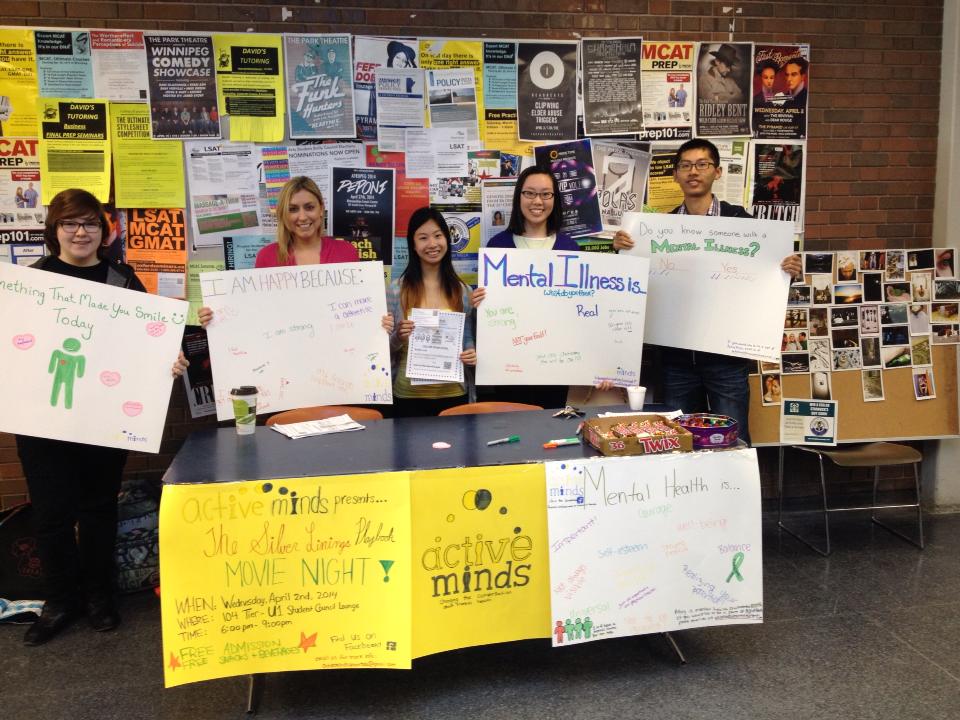
The Active Minds student group in University Centre.
Active Minds: The paradox of mental health

Students Cindy Ye (president) and Deborah Chan (public relations) and Education instructor Stephanie Yamniuk are three-quarters of the executive team of the Active Minds student group.
Deborah Chan points out the dilemma: Mental health difficulties are so prevalent in students and mental health affects us all, she says — “but you never hear about mental health.
“It’s a paradox.”
It’s one reason Chan got involved with public relations for the U of M chapter of the national organization Active Minds, after she saw a posting for volunteers outside the student life office.
Recently established, Active Minds is the U of M’s first student-run mental health advocacy, awareness and education group.
All this week, to coincide with Mental Health Week, the Active Minds student group is presenting a chalk campaign outside University Centre. It includes “fill in the blank” messaging, to encourage other students to express their emotions. They’ve added some examples such as “I’m feeling sad” or “I’m feeling anxious.” The group will also be working with the Not Myself Today campaign, handing out buttons, posters and other materials across campus.
“I know a lot of people with mental health challenges — and I myself have had them, too,” says Cindy Ye, who is the current president of the Active Minds U of M chapter.
She also knows that people sometimes downplay their mental health problems.
For Ye, the struggles started in high school. “I never really talked about it, because I thought maybe it was normal — just stress.
“Growing up — my parents are Chinese and where they come from, they didn’t really know a lot about mental health issues. Whenever I would tell them, ‘I have anxiety,’ or ‘I’m feeling upset’ — they would think that maybe I was just stressed, or it was just school. But then, one night, I was super upset and my mom asked me what was wrong and she realized that maybe it was more serious than she thought. She took me to a doctor, and I was diagnosed with depression and panic disorder/anxiety.
Ye: ‘I started getting better. Medicines help — and just being able to talk about it helped too.’
“From there, I started getting better. Medicines help — and just being able to talk about it helped too.
“So I feel that it is very important.”
Both students point out that there are many on-campus resources for students who might be struggling with anxiety, depression or other mental health difficulties — but not everyone knows about them. And because stigma still exists, some students might avoid seeking out help. Ye and Chan want to change that.
Ye: ‘Mental illnesses are so much more common than people realize…. If we are willing to talk about mental health and the problems that surround it, it will be seen less as a weakness in society.’
Ye says that she has a special feeling for international students. Though she herself isn’t an international student, she can empathize with what they must go through, she says — living far from home and having the stress of trying to do well at university.
Chan agrees that university can be stressful for many students — and both want students to be able to recognize when that stress becomes a bigger problem.
“At what point does that stress start to interfere with your day-to-day life? It’s something that a lot of students don’t realize — that line between what’s stress and what’s more,” Chan says.
“If it comes a constant battle, it’s time to seek help. People might see it as a weakness — and we want to let people know that it should just be treated as a physical illness rather than something you don’t talk about or something you should be ashamed of.”
One in four will suffer with mental health problems at some point in their lives.
She points out that one in four will suffer with mental health problems at some point in their lives.
“The media tends to sensationalize it,” adds Ye. She says it means that mental illness is often portrayed in terms of its extreme cases, adding to its stigma and keeping people from seeking help.
What is the main message each of them want to give other students?
Deborah Chan: “It is not a sign of weakness to seek help! We encourage those with a cold, broken leg, diabetes or cancer to seek help but look away when others struggle with mental health issues. Often, the stigma seems worse than the mental health issue itself. The more people that unite to break down the stigma, the more it hope brings to those with mental health issues.”
Cindy Ye: “Personally for me, I think that the most important message I want students to get out of everything we do to raise awareness is to realize that mental health and mental illnesses does not only affect one person; it affects everyone. I think that mental health SHOULD be regularly talked about! It should not be seen as a weakness at all. Mental illnesses are so much more common than people realize.
“If we are willing to talk about mental health and the problems that surround it, it will be seen less as a weakness in society.”







